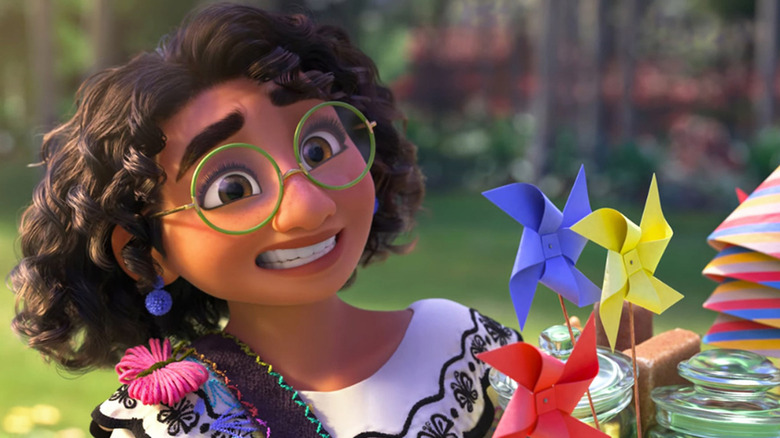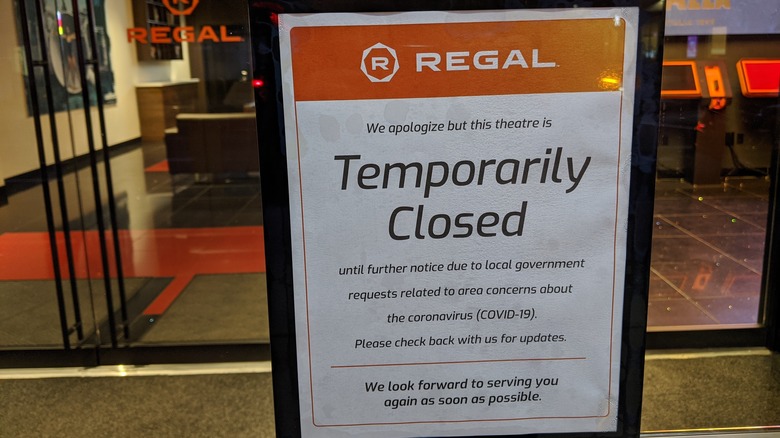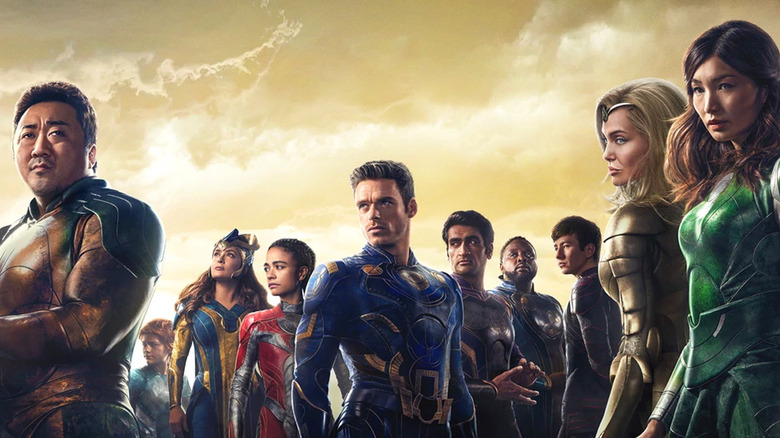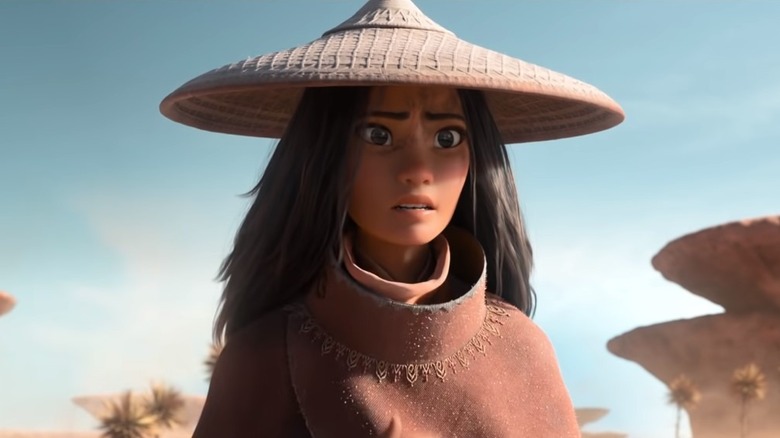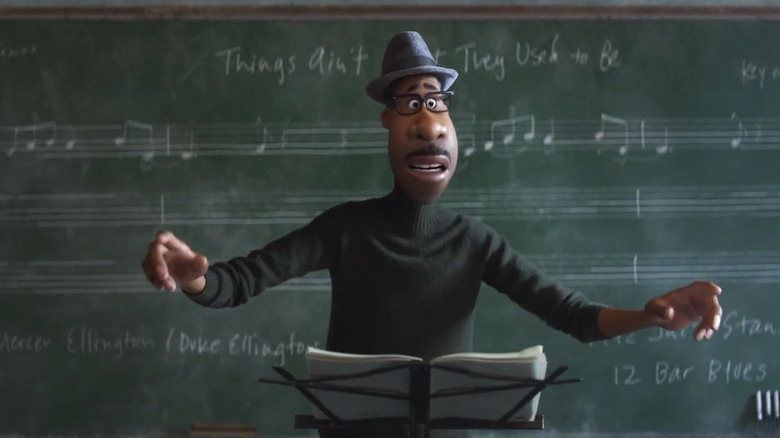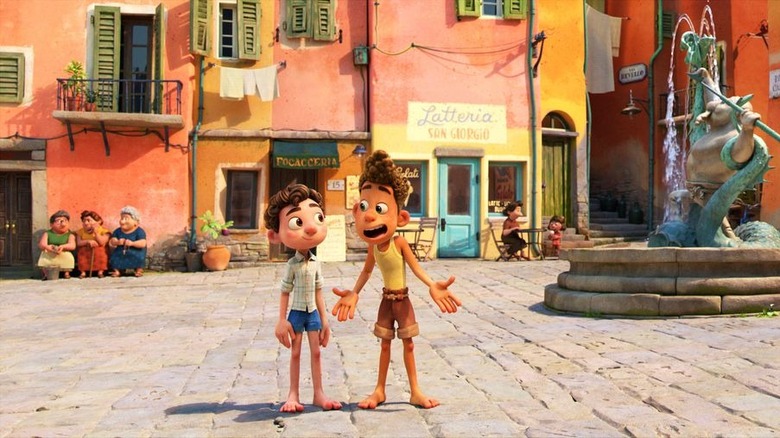Why Does Disney Still Lack Faith In Diverse Animated Movies?
Disney's recent announcement that "Turning Red" will debut on Disney+ in lieu of a theatrical release is the latest disappointment in a series of them, as the media giant has been routinely relegating a diverse array of animated films to its streaming platform during the pandemic.
In addition to "Turning Red" (which features an Asian protagonist), Disney previously opted to release "Soul," featuring Disney's first Black male protagonist, exclusively on Disney+ after canceling its theatrical run due to pandemic concerns. Similarly, once again citing pandemic concerns, Disney gave both "Raya and the Last Dragon" and "Encanto" limited theatrical runs before they were made available on Disney+, with the former receiving a day-and-date release. The obvious commonalities between each of these films is that they are all animated, and they all feature non-white protagonists.
Disney has had no issue sending some movies to theaters during this time (even non-franchise features like "Free Guy"), so why has it been so quick to send these animated features to Disney+? Does Disney lack confidence in its POC-led animated films? Is it solely due to the advent of COVID-19 and its impact on the movie theater industry? Whatever the reason, there is an undeniable pattern worth examining.
COVID vs. Movie Theaters
The easiest argument to make against the notion that Disney may have doubts about the potential success of its diverse animated films is that COVID-19 has undoubtedly had a major impact on, well, everything — and the film industry is no exception. 2020 lockdowns and other COVID-19 mandates saw the temporary closure of various movie theaters across the globe. As the pandemic continues to rage on, the simple act of catching a movie at your local theater has become a major potential health risk on both an individual and societal scale. Because of this, it makes sense that streaming services like Disney+ are increasingly becoming home to films that were originally destined for the big screen.
However, it's worth noting that if Disney was truly so concerned with public health, it could have simply chosen to release all of its latest movies on streaming platforms rather than continuing to release certain films in theaters while dropping others onto Disney+. Clearly there is a line being drawn about what is and isn't worthy of a theatrical release during this time, so how exactly is Disney deciding what movies audiences are likely to risk a theater trip for?
With any industry, money is typically the driving force behind decisions, so it's a reasonable assumption that Disney is just placing its bets on the movies it feels are the most likely to sell movie tickets. If this is the case, then it follows that there is likely criteria used to determine what movies will sell tickets, and what movies would fare better on Disney+. While we don't know that criteria, we can examine the movies Disney has put out during this time to try and gain some understanding.
Always Bet on Marvel?
As previously mentioned, Disney has still kept up with theatrical releases throughout the course of the ongoing pandemic. Notably, all four Marvel movies scheduled to release in 2021 were still released in theaters despite COVID concerns. In order of release date, these films include "Black Widow," "Shang-Chi and the Legend of the Ten Rings," "Eternals," and "Spider-Man: No Way Home" (though distribution for "No Way Home" was handled by Sony rather than Disney).
While their originally intended release dates were pushed back due to the pandemic, none of the films were yanked from theaters or released solely on Disney+. In fact, with the exception of "Black Widow," which debuted on July 9, 2021 in theaters and on Disney+ simultaneously, all of Marvel's films have been given theater-exclusive debuts. "Shang-Chi" received a 45-day exclusive theatrical release before the film was made available for home viewing on Disney+. Similarly, "Eternals" has been granted a 68-day window between its big and small screen debuts, with a theatrical release date of Nov. 5, 2021 and a Disney+ debut of Jan. 12, 2022.
Clearly, Disney is fine adjusting release dates and making theatrical releases work for some of its movies, so why is it that others are pulled from theaters prematurely, or never even given a chance to be seen on the big screen at all?
Disney's Animated Movies Get Burned
While every Marvel Studios film has been given a theatrical release, the animated films from Pixar and Walt Disney Animation Studios scheduled during this time period weren't so lucky. "Soul," which features a Black protagonist and predominantly Black cast, had its theatrical release taken away entirely. With an initial release date of June 19, 2020, Soul's big screen debut was pushed back to Nov. 20 due to pandemic concerns, and then eventually canceled altogether in favor of a Disney+ release on Dec. 25 — although it still received a theatrical debut in non-US countries that didn't have access to Disney+. If Disney was willing to give "Soul" a theatrical debut in foreign territories, why not do the same in the US? Surely if the pandemic was such a concern, there would have been no theatrical release at all.
"Raya and the Last Dragon," a fantasy film inspired by Southeast Asian cultures, received a similar treatment to "Black Widow," hitting both movie theaters and Disney+ on March 5, 2021. However, unlike Natasha Romanoff's solo film, Raya's theatrical release was severely stunted due to several theater chains refusing to screen the movie at all, citing issues with Disney's rental terms regarding the same-day Disney+ release. One of the biggest hits came from Cinemark, the third largest theater chain in the US.
Next there was "Luca," a fantasy film set on the Italian Riviera and inspired by director Enrico Casarosa's own childhood memories of growing up in Genoa. Despite a planned theatrical release set to begin on June 18, 2021, Disney decided to do the same thing it did with "Soul," forgoing any semblance of a theatrical run and dropping it on Disney+ instead, once again citing pandemic issues — even though "Raya" received a (stunted) theatrical release, as did "Black Widow," which debuted less than a month later. Once again, this weakens the "pandemic concerns" argument.
Following these films is "Encanto" a musical highlighting Colombian culture and myths. While "Encanto" was granted some time on the big screen — debuting in theaters on November 24, 2021 — it was given a mere 30-day theatrical run between hitting theaters and its Disney+ release date. Even so, "Encanto" still garnered major critical and financial success, earning mostly positive reviews and becoming the highest grossing animated film of 2021. Unsurprisingly, the pandemic was the reason given for the incredibly short theatrical window that "Encanto" received.
As for upcoming animated films, while "Turning Red" –- directed by Chinese-Canadian filmmaker Domee Shee, who also directed the Academy Award winning Pixar short "Bao" — has had its theatrical run canceled and will now debut in March exclusively on Disney+, there are currently no plans to limit or cancel the June 22 theatrical release of "Lightyear" — yet another "Toy Story" spinoff and the origin story of fictional astronaut Buzz Lightyear.
Incredibly Poor Optics Concerning Representation & Inclusivity
While the pandemic is a perfectly valid reason to adjust how movies are released, it becomes less valid when certain films have their theatrical releases protected and others go straight to streaming — especially when the release dates for these films overlap. Given the strikingly disproportionate treatment of Disney's live-action blockbusters in comparison with its pandemic-era animated films –- all of which are comparably more culturally and/or ethnically diverse than Disney's typical feature films -– the optics surrounding this treatment are incredibly poor. Understandably, many have started to question why Disney appears to be relegating its more diverse animated offerings to streaming platforms while making an effort to keep its live action films on the big screen. It's not wrong to question why the media giant chose prioritize its live-action films while a new wave of POC-led and culturally diverse animated movies were being dumped on Disney+.
When films aren't being impacted the same way across the board, the pandemic begins to look a lot like an excuse for Disney to appear more diverse in its offerings while still keeping "safe bets" at the forefront. The apparent lack of confidence in these original animated features undercuts efforts to offer meaningful representation to groups that have been historically underrepresented in Disney's media and in American media by extension. It sends a message that these beautiful films, which highlight underrepresented groups and cultures, are more of an afterthought than something that Disney has an interest in truly pursuing with the full weight of its influence.
For those of us who remember the VHS era, it's not unlike the difference between the attention and care given to Disney's big-budget animated films in comparison to its lackluster straight-to-video sequels and spinoffs. The difference is that films like "Encanto" and "Soul" aren't low-budget cash grabs that were never destined for the big screen — so why are they being treated as such? It sends a message that unless there are other factors to consider — such as "Shang-Chi" being part of the Marvel Cinematic Universe or "Raya" having major Hollywood stars voicing the characters — meaningful diversity and representation is not something Disney is willing to fully bet on. This is particularly frustrating, given that the massive success of "Coco" proved that diverse, original animated films can absolutely deliver at the box office without super well-known actors or existing franchises to back them up.
Of course, some instances of Disney using its streaming platform as a dumping ground of sorts were unavoidable due to the mass closure of theaters and other public spaces that occurred during the onset of the pandemic in 2020. "Onward" was an animated feature that suffered in terms of financial success for this reason, as it had barely begun its theatrical run when theaters began to close. We can even extend this reasoning to "Soul" — although that film faced scrutiny for unrelated reasons surrounding Disney's track record of turning all of its Black leads and several other POC protagonists into animals and non-human entities.
Personally, I feel that Disney still has a long way to go in terms of consistently providing — and fully supporting — films that feature diverse and meaningful representation. While there are other factors at play, given the evidence above, the company definitely has some confidence issues with giving its diverse animated films a real chance to shine in theaters.
The Bottom Line: Disney Can and Should Do Better
I'm not one to downplay the severity of a public health crisis, but there's obviously an issue here. However we may personally feel, going to the movies now carries a certain level of risk. Where Disney is letting audiences decide for themselves if that risk is worth it for its live action films, it is preemptively deciding for us that its original animated films are not. Why does "Lightyear" warrant an exclusive theatrical release when "Turning Red" doesn't? Surely the release of the latter could have been pushed back to allow for a proper theatrical run the same way Disney has made numerous adjustments and allowances for its non-animated films.
The fact that diverse audiences (and particularly children) who were excited to finally see themselves represented on the big screen are being repeatedly let down is not to be taken lightly. Disney's lack of interest in giving these movies proper theatrical releases may also bode poorly for the future of representation in media. There are valid concerns that Disney and other studios will claim that the "failure" of these films to draw large audiences in theaters (when they were hardly given a fighting chance to begin with) means it's not worth continuing to highlight historically underrepresented groups. This would be a major step back, denying non-white and culturally diverse audiences and artists alike the opportunity to see or create something special that reflects their own identities and experiences.
Why is Disney deciding for us that, for whatever reason, POC-led and culturally diverse animated films are not worth the risk? Why is meaningful representation being repeatedly sidelined with an excuse that doesn't hold weight when all factors are considered, and Disney's own actions pertaining to pandemic concerns are contradictory? It's ultimately just not a good look to have several racially and culturally diverse animated films become sacrificial lambs for supposed public health efforts, while films that feature white leads and/or exist within the lucrative Marvel Cinematic Universe are still given every effort to preserve and prolong their time in the spotlight.
